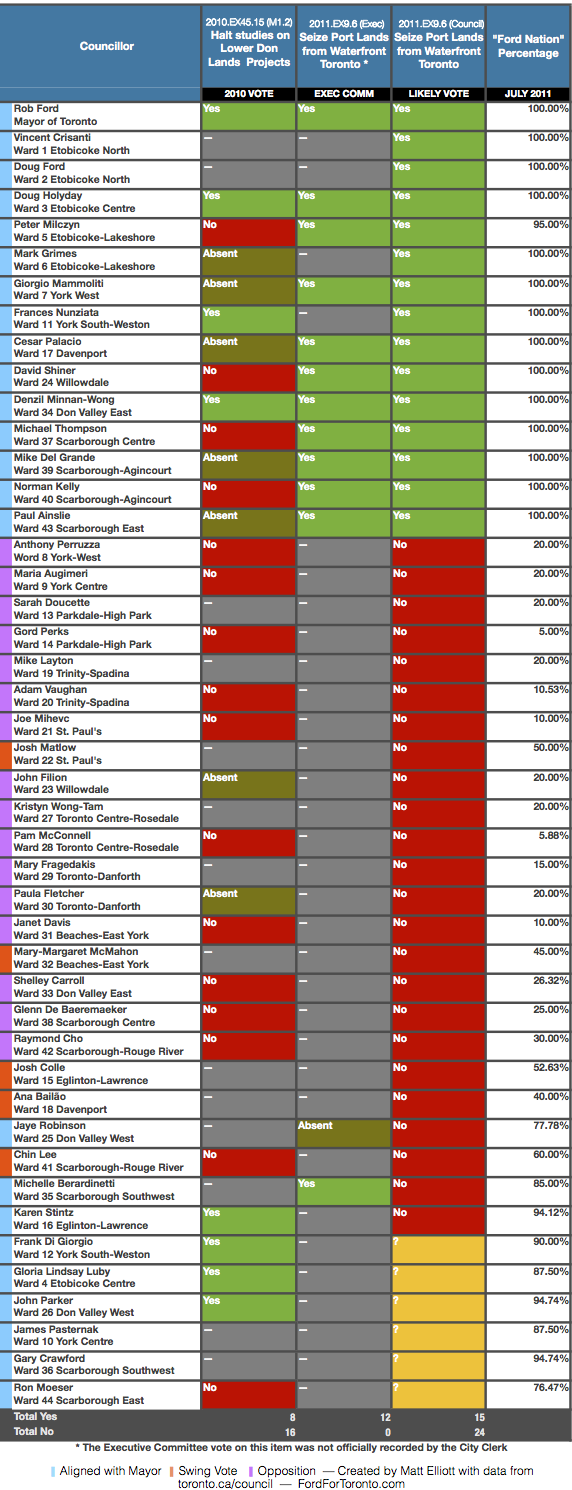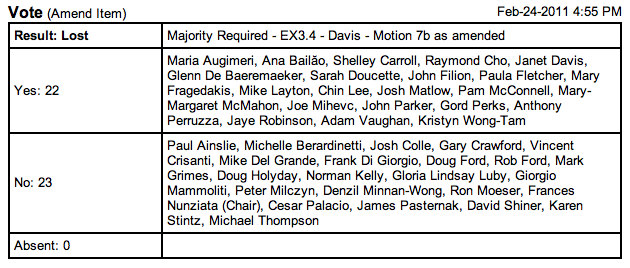Updated Sept 16, 2011 — 9:27 p.m. The Toronto Star has now reported that Michelle Berardinetti and Karen Stintz are likely ‘no’ votes. I’ve also moved Frank Di Giorgio to the ‘maybe’ column. The remaining 15 ‘yes’ votes are the most bedrock Ford supporters, so I don’t expect to see much change from this point onward. It’s obvious at this point that the item as originally presented is doomed. The mayor’s office must now scramble to find a face-saving compromise motion.
A quick update on the voting chart from last week:
Lots of movement on the chart: previously up-in-the-air Councillors Colle, Bailão, and Lee were switched to presumed ‘No’ votes. Councillors Berardinetti, Lindsay Luby and Parker have been re-listed as questionable votes after sources indicated they are all feeling rather conflicted about things.
The big news, though, is Councillor Jaye Robinson who, despite sitting on the mayor’s executive committee, announced that she would not be supporting the Ford-driven item to seize the Lower Don Lands and Port Lands from Waterfront Toronto. This is an important development not only for waterfront watchers but for council as a whole, as it severely weakens the mayor’s ability to obtain a majority going forward.
It remains to be seen whether this is only a minor blip in the relationship between Councillor Robinson and the Mayor — which has always felt a bit awkward and forced, she a rather centre-left type with an interest in the arts and he an iconoclast with a hate-on for government programs — or a significant sea change. How the mayor’s office responds to this outburst of independent thinking is the thing to watch. (When former councillor Brian Ashton, as an executive committee member, voted against one of Mayor David Miller’s key items, Ashton was quickly cast into the wilderness and removed from the committee.)
The Fords now face a looming council vote that looks very challenging for them to win. With 22 likely ‘No’ votes, their only hope is that all of the remaining available votes go their way without any absences in the chamber when the bells ring. This is a very unlikely scenario.
Councillor Peter Milczyn — a Ford guy — has been rather frank about their failure on this one. He told the Toronto Star’s Royson James that this “blew up in our faces” and, also, that “there is egg on our faces for allowing this.” Their collective faces have definitely seen better days.
So what happens now? It’s unlikely the item will make it to vote when council meets next week, unless something drastic or daring happens. Expect a deferral motion or another stall tactic to send this to staff for further study. A 1,333-word epic of an email from Milczyn’s office appears to lay out a future compromise that would see Waterfront Toronto and the Toronto Port Lands Company work together to review the collective plan for the Port Lands. Why TPLC needs to be involved at all is a fair question at this point.
It continues to amaze me just how many political missteps the mayor and his brother are making these days. There were probably dozens of workable strategies that would have resulted in the technical and contractual changes necessary to wring more value for the city out of Port Lands development. None of those strategies involved the councillor from North Etobicoke trotting out to the media with visions of a giant ferris wheel and an honest-to-god plan for a monorail. What kind of political strategy is that? What kind of meeting ends with everyone agreeing that the answer is sending Doug Ford out there to really wow ’em with some razzle dazzle?
Despite all this good news, I will caution that nothing is set in stone and a lot can change in the week ahead. Keep watching CodeBlueTO for further updates, and — if you haven’t already –Â sign the petition.


